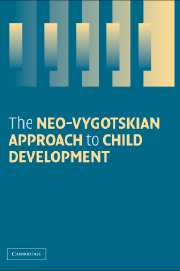Book contents
- Frontmatter
- Dedication
- Contents
- List of Figures
- Acknowledgments
- Introduction: The Problem of Determinants and Mechanisms of Child Development; The Structure and Content of the Book
- 1 Vygotsky's Approach to Child Development
- 2 The Neo-Vygotskian Elaboration of Vygotsky's Approach to Child Development
- 3 First Year of Life: Emotional Interactions With Caregivers as the Leading Activity of Infants
- 4 Second and Third Years of Life: Object-Centered Joint Activity With Adults as the Leading Activity of Toddlers
- 5 Three- to Six-Year-Olds: Sociodramatic Play as the Leading Activity During the Period of Early Childhood
- 6 The Period of Middle Childhood: Learning at School as Children's Leading Activity
- 7 The Period of Adolescence: Interactions With Peers as the Leading Activity of Adolescents
- Conclusion The Neo-Vygotskian Approach to Child Development: Accomplishments and Shortcomings
- References
- Author Index
- Subject Index
1 - Vygotsky's Approach to Child Development
Published online by Cambridge University Press: 05 August 2014
- Frontmatter
- Dedication
- Contents
- List of Figures
- Acknowledgments
- Introduction: The Problem of Determinants and Mechanisms of Child Development; The Structure and Content of the Book
- 1 Vygotsky's Approach to Child Development
- 2 The Neo-Vygotskian Elaboration of Vygotsky's Approach to Child Development
- 3 First Year of Life: Emotional Interactions With Caregivers as the Leading Activity of Infants
- 4 Second and Third Years of Life: Object-Centered Joint Activity With Adults as the Leading Activity of Toddlers
- 5 Three- to Six-Year-Olds: Sociodramatic Play as the Leading Activity During the Period of Early Childhood
- 6 The Period of Middle Childhood: Learning at School as Children's Leading Activity
- 7 The Period of Adolescence: Interactions With Peers as the Leading Activity of Adolescents
- Conclusion The Neo-Vygotskian Approach to Child Development: Accomplishments and Shortcomings
- References
- Author Index
- Subject Index
Summary
The basic idea of Vygotsky that underlies his approach to child development is that its determinants are principally different from the determinants of animals' development. Vygotsky holds that the role of mental processes in both animals and humans is to serve their practical activity (Vygotsky & Luria, 1930/1993). The practical activity of humans, however, is principally different from the practical activity of animals. Animals live in a natural environment, and the goal of their activity is adaptation to that environment. In the course of evolution and natural selection, each species of animal has developed adaptive mechanisms (instincts) that are genetically transmitted from one generation to the next. The behavior of lower animals (invertebrates) is predominantly of an instinctive nature. Vertebrate animals, in addition to instinctive forms of behavior, demonstrate many learned behavioral patterns, which are called conditioned reflexes. In contrast to instincts, which are “the means of adaptation to such environmental conditions that are more or less permanent and stable,” conditioned reflexes are “a much more flexible, delicate, and perfected mechanism of adaptation to the environment, which deals with the accommodation of inherited instincts to the animal's individual, specific environmental conditions” (Vygotsky & Luria, 1930/1993, pp. 24–25). The formation of conditioned reflexes in the course of individual learning represents “a new step” (Vygotsky & Luria, 1930/1993, p. 24) in the development of mechanisms of animals' adaptive behavior.
Information
- Type
- Chapter
- Information
- The Neo-Vygotskian Approach to Child Development , pp. 15 - 44Publisher: Cambridge University PressPrint publication year: 2005
Accessibility standard: Unknown
Why this information is here
This section outlines the accessibility features of this content - including support for screen readers, full keyboard navigation and high-contrast display options. This may not be relevant for you.Accessibility Information
- 1
- Cited by
